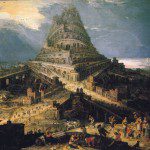Refusing to say we “know” the time is central to Christianity precisely because it is an act of humility; it acts as a bulwark against the human temptation to test God, to pretend that we can read the signs of the times, as if each and every one of us were a prophet. It is a way of guarding against overreach.
In fact, not predicting the end, not seeing every age as some particular apostasy, is how we truly “stay prepared” (a theme also found in Matthew 24). You see, if the Apocalypse’s date cannot be traced then we have the liberty of inhabiting the space between knowledge and faith; we must be prepared because it could come at any time, but since we do not know when, we do not risk breaking with humility and announcing ourselves the harbingers of something we cannot know.
Make no mistake, consciously to choose humility is not easy. Yes, resisting the temptation to prophesy the end is the truly difficult endeavor, an exercise in self-control, one might say. As Sam Kriss has commented:
The philosopher Tom Whyman, for instance, wrote earlier this year that “we’ve successfully secularized the End Times.” It’s all a kind of wishful thinking, he argues; everyone wants to think that the end of the world is imminent, because it means that all the messy contingencies of life will finally become settled, and this desire is given form and propulsion by a still-dominant Judeo-Christian-Islamic conception of linear time. Once we expected to hear trumpets and angels; now it’s just the wandering honk of a puffed-up president announcing to the world that he’s pushing the button. But it’s the same thing.
We want the end, because the end means the end of contingencies of all this confusion, of all the difficulties that plague us from birth to death. Why else imagine zombies and dystopias, now some of our favorite pastimes?
But this is not the answer of the Church. The Church might lament with Qoheleth and with Job; it might cry out in anguish: “is it not better that a man is not born than to endure the horrors of life?” It might scream: “I have suffered since the day I came out of my mother’s womb!” But to cry out in pain need not be a challenge; it may be a humble affirmation of one’s smallness, of the joy on the other side of detachment from the creeping difficulties of human experience. It is better to cry as from a place of excruciating pain than to treat every speck of dust as justification for one’s fantasies of wholeness and sense.
The answer, as always, is humility. And there is no man less humble than he who never tires of blowing a trumpet in the public square, and no man better than he who sees himself as better than none.













